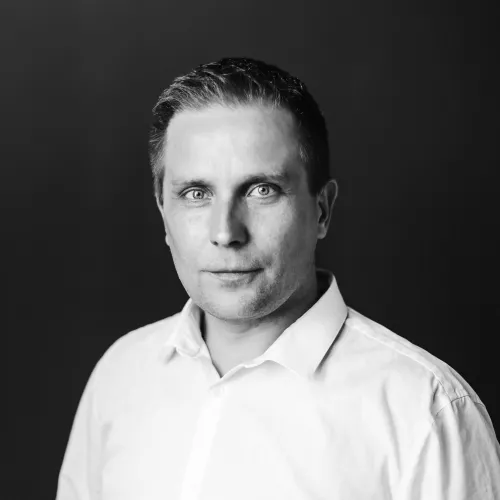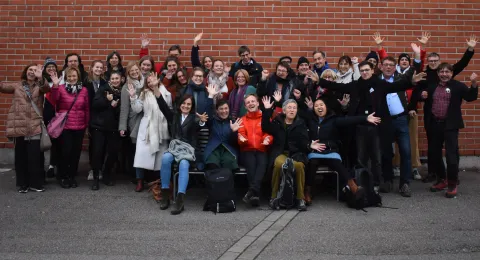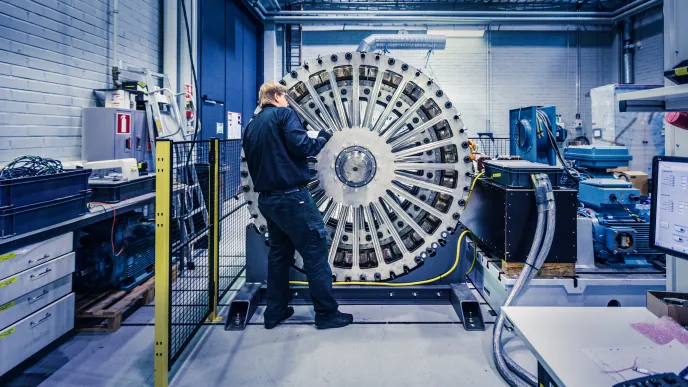In October, a group of sustainability enthusiasts from 30 different German universities and institutes of applied sciences visited LUT University’s Lappeenranta campus. The two-day-visit was organized by a foundation called Stiftung Innovation in der Hochschullehre in cooperation with LUT. The goal was to transfer knowledge, share sustainability practices and get to know the university’s day-to-day life behind them. Sustainability built strongly into LUT’s strategic core was something the visitors both appreciated and wondered about.
“LUT is the most concentrated university I know, and its systematic strategy first piqued our interest. The strong message stood out because German universities usually communicate it much more broadly,” says Dr. Antje Mansbrügge, innovation director of the German foundation.
The group was especially interested in how LUT’s staff, students, campus cities, partner companies and other stakeholders collaborate to promote the UN’s Sustainable Development Goals in academic education, societal interaction and scientific research. Most importantly, the group wanted to learn how LUT leads sustainable change, turning its sustainability ambition into action and its ideas into practice.
“We wanted to get a different perspective and searched for an inspiring learning environment, which LUT really is. In Germany, we face similar challenges when it comes to sustainability. The biggest question isn’t the lack of ideas, but the implementation and money,” says Dr. Esther Bishop, dialogue and networking officer of the German foundation.
The group of visitors comprised 33 people: students, teaching and research staff, university administration and management. According to Bishop, most group members had a great deal of experience in change management at higher education institutions but some also in activism. The multidisciplinary group included historians, engineers, and professionals from fields such as teacher education, health, psychology, literature, film production, media, and communications.
Questions in abundance and four key takeaways
The fruitful visit included introductions on different aspects of LUT’s sustainability work, a full day of workshops, a visit to the Jamie Hyneman Center (JHC), and informal activities, such as a Biotrail walk in a forest. Esther Bishop planned the program with LUT’s sustainability manager, Kati Koikkalainen.
“Together, we developed a completely new program in just four meetings and achieved a balanced combination of formal sessions and informal activities. People in similar positions in Finland and Germany could genuinely share their experiences and thoughts,” Bishop assesses.
What was characteristic of the visit was the massive number of questions and lively discussion between the two groups of curious people. About 25 people from LUT shared their experiences and best practices with the visitors with great enthusiasm. Bishop summarized the German group’s four key takeaways from the visit:
“Firstly, LUT focuses on doing rather than talking, which is a much-needed attitude in climate issues. Secondly, the visit showed us how people at LUT live up to the slogan Land of the Curious – it’s not just empty words. Thirdly, we saw how leading sustainable change is built on trust, not just indicators.”
As the fourth point, the German group found LUT’s history an inspiring example of rising from rock bottom to success. By this, Bishop refers to the threat of the university closing in the early 2000s and LUT’s hard work to create, commit to and spotlight a new strategy.
New friends, reflection, and adaptation plans
To visit LUT, the group traveled from Hamburg to Helsinki by ferry and by bus to Lappeenranta, then back. The journey lasted one whole week. According to Bishop, it was a sustainable choice in two ways: ferry rides release fewer emissions than air travel, and the time spent traveling was put to good use.
“On our way to Lappeenranta, we had the chance to prepare and develop our observation methods. On the way back, we had time to reflect and discuss what we’d learned.”
Bishop argues that the learning process wouldn’t have gone as deep without meetings on campus.
“The point was to create possibilities for personal connections and things happening by chance. So far, the best thing has been making friends and face-to-face meetings after the pandemic,” she explains.
Next, the group of visitors will hold online learning sessions and three more workshops together, and then, they’ll develop their ideas and pass on what they’ve learned during the program. According to Bishop, they’ll lead change in their own institutions. In the future, another group may also visit LUT.
“The visit was fantastic! I hope that our cooperation with LUT continues. Next autumn, we’re going to run another sustainability program, and we’re planning to continue the program in the future,” Bishop concludes.
More information:

Janne Hokkanen
Esther Bishop
Dialogue and networking officer
Stiftung Innovation in der Hochschullehre
bishop@stiftung-hochschullehre.de
+49 40 6059815 23





